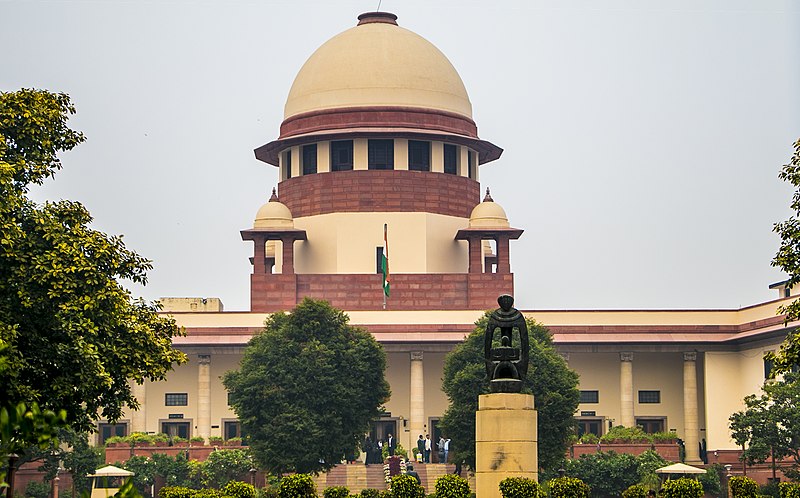What extent the Court can take cognizance of a clause relating to purpose for which a lease is granted contained in an unregistered deed of lease for immovable property stipulating its duration for a period of five years. (Para 2)
The original plaintiff (i.e. the landlady) claimed, inter-alia, recovery of possession as also decree for mesne profit. (Para 3)
For the purpose of adjudicating the present appeal, we need to look into the provisions of Sections 105, 106 and 107 of the 1882 Act and the provisions of Sections 17 and 49 of the Registration Act, 1908 (hereinafter “1908 Act”). (Para 8)
The appellant has argued that the Trial Court had admitted the lease agreement in evidence, and for determining the purpose of lease, we can examine the deed. But this argument is flawed. This provision contemplates lease for manufacturing purpose, in absence of contract or local law to the contrary, shall be deemed to be year to year lease. In that case, it would require six months’ notice for termination. But here, the agreement itself provides a five year duration, and hence ex-facie becomes a document that requires compulsory registration. That is the mandate of Section 107 of the 1882 Act and Sections 17 and 49 of the 1908 Act. The Court cannot admit it in evidence, as per the judgment in the case of Anthony (supra). A coordinate Bench in the case of Shyam Narayan Prasad -vs-V. Krishna Prasad and Ors. [(2018) 7 SCC 646] has re-affirmed this view, referring to Section 49 of the Registration Act. This is a prohibition for the Court to implement and even if the Trial Court has taken it in evidence, the same cannot confer legitimacy to that document for being taken as evidence at the appellate stage. The parties cannot by implied consent confer upon such document its admissibility. It is not in dispute in this case that the period between service of notice and institution of the suit fell short by four days of completion of six months. In any case, we do not consider it necessary to address this question as in our opinion, the requirement to give six months’ notice does not arise in this case. That point has not been raised before us. (Para 10)
The fault line in the defendant’s case also lies on the point as to whether the lease was for manufacturing purpose or not, which was examined by the High Court and decided against the appellant. The defendant tried to establish from the clause of the lease agreement, statement made in the plaint as also his evidence before the Trial Court that the lease was for manufacturing purpose. (Para 11)
On behalf of the appellant, however, it was urged, referring to the provisions of Section 49 of the Registration Act that for establishing nature and purpose of possession, even an unregistered document could be looked into as that would come within the ambit of collateral purpose. (Para 12)
In our opinion, nature and character of possession contained in a flawed document (being unregistered) in terms Section 107 of the 1882 Act and Sections 17 and 49 of the Registration Act can form collateral purpose when the “nature and character of possession” is not the main term of the lease and does not constitute the main dispute for adjudication by the Court. In this case, the nature and character of possession constitutes the primary dispute and hence the Court is excluded by law from examining the unregistered deed for that purpose. (Para 13)
That in the absence of a registered instrument, the courts are not precluded from determining the factum of tenancy from other evidence on record as well as the purpose of tenancy. In this case, factum of creation of tenancy has been established. But the purpose of tenancy, so as to attract the six months’ notice period under Section 106 of the 1882 Act cannot be established by such evidence as in such a situation, registration of the deed would have been mandatory. The onus would be on the defendant to establish the fact that manufacturing activity was being carried on from the demised premises. A mere statement by the DW-1 to which we have referred earlier or the purpose of lease as specified in the lease agreement would not be sufficient to demonstrate the purpose of lease to be for manufacturing. This could be proved by explaining what kind of work was being carried on in the factory shed. In such a situation also, the registration of the deed would have been necessary. In absence of such registration, tenancy would have been of “month to month” character. (Para 15)
SUPREME COURT OF INDIA
2023 STPL(Web) 295 SC
[2023 INSC 854]
M/S Paul Rubber Industries Private Limited Vs. Amit Chand Mitra & Anr.
Civil Appeal No. 6149 of 2023 (Arising out of Petition for Special Leave to Appeal (Civil) No. 15774 of 2022)-Decided on 25-9-2023
https://stpllaw.in/wp-content/uploads/2023/10/2023-STPLWeb-295-SC.pdf







